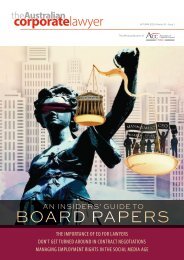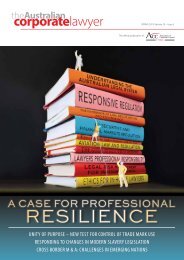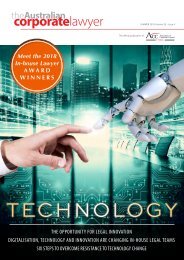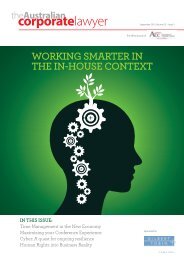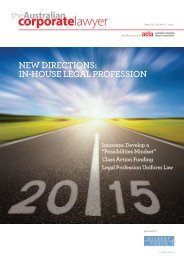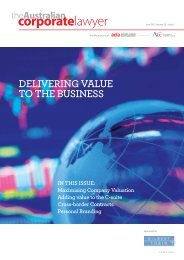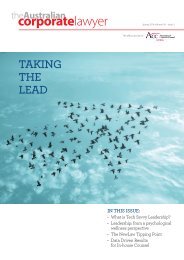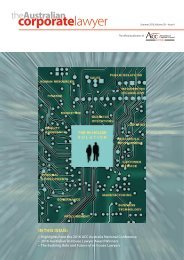Australian Corporate Lawyer - Autumn 2017
Australian Corporate Lawyer is the official publication of the Association of Corporate Counsel (ACC) Australia. The Autumn 2018 issue focuses on 'The Law and Technology' and features a range of articles covering topics including: the future of contracts and; the future of law firms as software companies..
Australian Corporate Lawyer is the official publication of the Association of Corporate Counsel (ACC) Australia. The Autumn 2018 issue focuses on 'The Law and Technology' and features a range of articles covering topics including: the future of contracts and; the future of law firms as software companies..
You also want an ePaper? Increase the reach of your titles
YUMPU automatically turns print PDFs into web optimized ePapers that Google loves.
acla.acc.com<br />
LEAD YOUR ORGANISATION TO SUCCESS<br />
IN ASIA-PACIFIC WITH A GLOBAL MINDSET<br />
As organisations increasingly pursue<br />
opportunities in the Asia-Pacific<br />
region; how can the legal department<br />
participate in leading the organisation to fast,<br />
efficient and lasting success?<br />
The consequences of missing the legal<br />
perspective in market entry and growth<br />
situations early on or well into establishing<br />
the international presence are well known<br />
to many famous Western businesses ranging<br />
from Mattel and Glaxo Smith Kline in China<br />
to Apple in South Korea. Some of these<br />
businesses failed to enter the expected<br />
growth, others faced many painful legal<br />
battles costing their businesses as well as<br />
their countries unacceptable amounts in the<br />
form of financial and reputation cost, and<br />
others again had to leave the market either<br />
due to local legal issues or conflicts with the<br />
home legal mentality and laws. Clearly, the<br />
in-house counsel has an essential leadership<br />
role to play in organisations wanting to grow<br />
in foreign markets.<br />
Cultural Understanding Builds Trust<br />
Working in countries like Indonesia, Singapore,<br />
Malaysia and China where many companies<br />
have growth aspirations requires an<br />
understanding of the regulatory landscape,<br />
the factors that may put the company at risk<br />
within the local market as well as in the home<br />
country of the company, and the culture in<br />
these markets.<br />
Although one needs to be very aware of<br />
diversity factors especially in Singapore<br />
and Hong Kong as in each specific Asian<br />
country, cultural studies indicate that people<br />
in Asia value long-term relationships and<br />
observe social hierarchies significantly. They<br />
also value group harmony and may express<br />
themselves much more indirectly than in<br />
Western cultures. “Communication is culture”<br />
said Edward Hall, an American anthropologist,<br />
and internationally working executives need<br />
to be aware that much of communication<br />
happens in the nonverbal sphere in all<br />
cultures. A symbol, ritual or tradition may<br />
have totally different meanings in a foreign<br />
culture compared with the home culture.<br />
The <strong>Australian</strong> fans may not have had the<br />
intention to offend the Malaysian people or<br />
authorities when they wanted to celebrate<br />
Daniel Ricciardo’s success at the 2016 Grand<br />
Prix but found themselves having done so<br />
leading to having to face legal consequences.<br />
Culture influences how we communicate<br />
and hence many business skills ranging<br />
from selling to conflict management and<br />
negotiations. But most critically, it influences<br />
how we build trust. In her book the “Culture<br />
Map”, Erin Meyer differentiates between<br />
cognitive and affective trust building. She<br />
writes “Cognitive trust is based on the<br />
confidence you feel in another person’s<br />
accomplishments, skills and reliability. It is<br />
often built through business interactions: we<br />
work together, you do your work well, and<br />
you demonstrate through the work that you<br />
are reliable, pleasant, consistent, intelligent,<br />
and transparent. Result: I trust you. Affective<br />
trust, on the other hand, arises from feelings of<br />
emotional closeness, empathy or friendship.<br />
This type of trust comes from the heart. We<br />
laugh together, relax together, and see each<br />
other at a personal level, so that I feel affection<br />
or empathy for you and sense that you feel<br />
the same for me. Result: I trust you.“ Meyer’s<br />
research shows that task-based operating<br />
cultures like Australia and the U.S. tend to rely<br />
mainly on cognitive trust building in work<br />
relationships. Relationships are built around<br />
tasks, projects, new ventures. They tend to<br />
be practical and are often summarised in<br />
contracts. People in China on the other hand<br />
may perceive the inability to build trust in<br />
cognitive and affective ways at the same time<br />
as a lack of sincerity and loyalty. The deep<br />
personal relationship may be the contract, the<br />
“yes” to a new venture or the insurance policy<br />
in case of a crisis.<br />
Whirlpool approached the Asia<br />
Market with a Global Mindset<br />
“The adoption of a global mindset begins<br />
at home for multinational corporations<br />
as colleagues interact across borders and<br />
therefore cultures.” said Deborah Vaughn, the<br />
Chief Legal Officer of Whirlpool Corporation.<br />
She continued “Our Asia Pacific law<br />
department based in Shanghai and Delhi has<br />
a team of 15 lawyers and non-lawyers with the<br />
capability to speak six languages. In search of<br />
the next learning, our dispersed and diverse<br />
team is curious and open to the differing<br />
views across our region”.<br />
Unlocking the innovative potential of<br />
the team is also a matter of navigating<br />
cultural sensitivities. Although it varies from<br />
company to company, compared to the<br />
West, the relationship between supervisor<br />
and direct report in India is generally more<br />
formal and hierarchical; and decisions being<br />
Şirin Köprücü<br />
Having lived and worked in Turkey, the UK,<br />
Switzerland, and Germany and gained degrees<br />
in two countries, Sirin is fluent in three languages<br />
and is a true citizen of the world. As the owner<br />
of StrategicStraits, Inc., an international business<br />
training and consulting firm in Washington,<br />
DC., she has facilitated programs to help<br />
internationally growing clients achieve fast,<br />
efficient and lasting growth through the<br />
development of a global mindset and effective<br />
business skills.<br />
Deborah Vaughn<br />
Having worked in the US, Europe and Asia,<br />
Deborah is the head of Whirlpool Corporations<br />
legal function in the Asia Pacific region. She is a<br />
member of Whirlpool’s Global Legal; Asia North<br />
and Asia South Executive Leadership teams and<br />
sits on the Board of Directors of the Shanghailisted<br />
Whirlpool China Limited. Deborah is<br />
admitted to practice in New York, England and<br />
Wales, Singapore, and Malaysia.<br />
VOLUME 27, ISSUE 1 – AUTUMN <strong>2017</strong><br />
27



